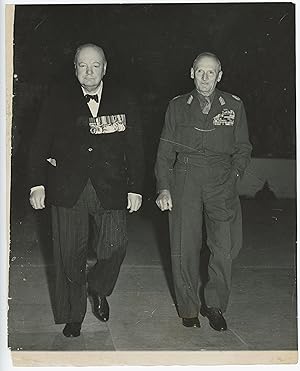Descripción
This original press photograph captures Winston S. Churchill and Field Marshal Bernard Montgomery, 1st Viscount Montgomery of Alamein, on 20 October 1950 at the El Alamein Reunion. The gelatin silver print on matte photo paper measures 10 x 8 inches (25.4 x 20.3 cm). Condition approaches very good. The paper is clean and the image clear with some light wear to the edges and a small loss to the lower left corner, largely confined to the white lower margin. The verso features a copyright stamp from "KEYSTONE Press Agency Ltd." and Keystone s original typed caption titled "EL ALAMEIN REUNION AT THE EMPRESS HALL… WINTON CHURCHILL AND MONTY ." The caption is dated "20.10.50" and reads "MR. WINSTON CHURCHILL was the chief guest at the El Alamein Reunion at the Empress Hall Earl s Court this evening. KEYSTONE PHOTO SHOWS:- MR. WINSTON CHURCHILL and VISCOUNT MONTGOMERY seen walking around the arena during the ceremonies this evening." Field Marshal Bernard Law Montgomery, 1st Viscount Montgomery of Alamein, KG, GCB, DSO, PC (1887-1976) earned his fame in North Africa during the Second World War. In August 1942, then-Prime Minister Churchill gave Montgomery command of the Eighth Army, where Montgomery famously beat Rommel and oversaw defeat of Axis forces in North Africa. He went on to command the Eighth Army in Sicily and Italy, and Allied ground forces during Operation Overlord. After the war he would rise to Chief of the Imperial General Staff and be elevated to Viscount Montgomery of Alamein.Montgomery and Churchill remained friends, but Montgomery s later years proved less elevated than those of Churchill. Montgomery s uncharitable accusations in his postwar memoirs lost him the friendship of Eisenhower and forced Montgomery to publicly apologize to a fellow Field Marshal. Montgomery earned further criticism for declaring support for Apartheid and praising communist Chinese leadership.This press photo once belonged to a newspaper s working archive. During the first half of the twentieth century, photojournalism grew as a practice, fundamentally changing the way the public interacted with current events.Newspapers assembled expansive archives, including physical copies of all photographs published or deemed useful for potential future use, their versos typically marked with ink stamps and notes providing provenance and captions. Photo departments would often take brush, paint, pencil, and marker to the surface of photographs themselves to edit them before publication. Today these photographs exist as repositories of historical memory, technological artifacts, and often striking pieces of vernacular art. N° de ref. del artículo 005628
Contactar al vendedor
Denunciar este artículo
![]()

